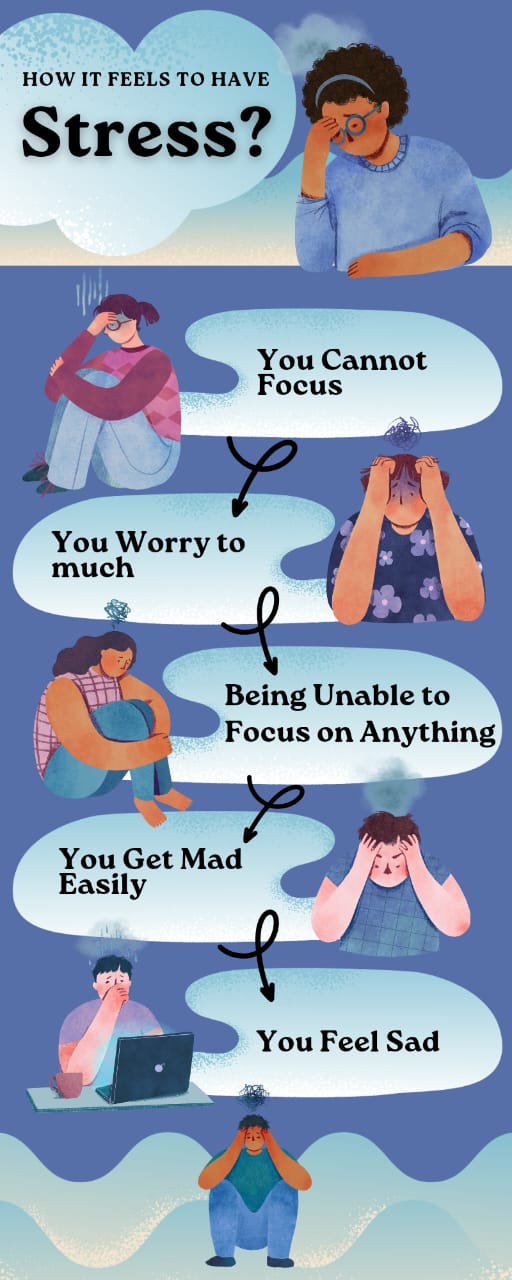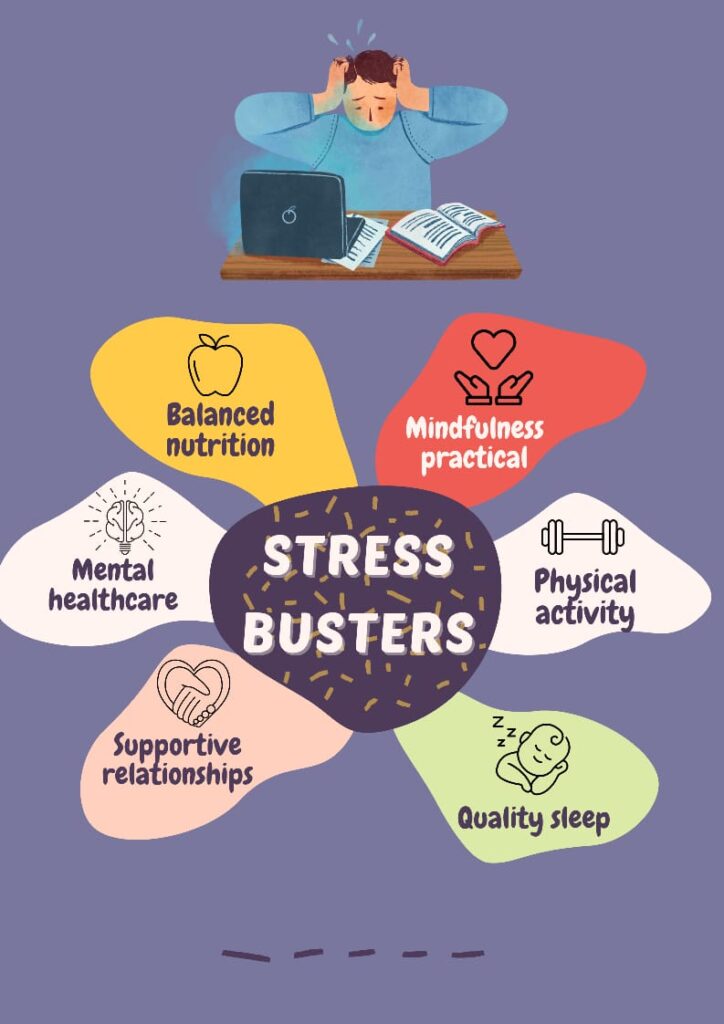“Stress is not what happens to us. It’s our response to what happens. Learn the art of stress management to find inner peace. Start your journey today!”
Stress is becoming a common and even inevitable part of living in the fast-paced world of modern life. Although stress is a normal reaction to difficulties, prolonged or severe stress can be harmful to both physical and emotional health. The purpose of this blog is to examine the nature of stress, its various forms, and practical methods for stress management.
What is stress?
Stress is the body’s and mind’s reaction to an imagined danger, difficulty, or requirement. It sets off the body’s “fight or flight” response, causing the release of hormones that prime the person to deal with the stressor.
Stress can affect a person’s mental, emotional, and physical health in a variety of ways. While some stress is normal in life, prolonged or severe stress can be harmful to one’s general health.

Types of stress:
1-Acute Stress:
Short-term stress triggered by an immediate threat or challenge.
2-Chronic Stress:
Persistent, long-term stress frequently associated with recurring circumstances such as relationship problems or work-related stresses.
3-Episodic Acute Stress:
People who often encounter acute stresses, leading to an episodic stress pattern.
4-Work-related Stress:
Stress brought on by deadline pressure, interpersonal dynamics, and job demands.
5-Life Events Stress:
Stress brought on by significant life transitions, such getting married, getting divorced, or losing a loved one.
6-Traumatic Stress:
Caused by being in proximity to horrific events, which frequently results in disorders like Post-traumatic Stress Disorder (PTSD).
Signs and symptoms of stress:
Applying different coping mechanisms and maintaining self-awareness are necessary for effective stress management, which is a continuous process. Through comprehending the characteristics of stress, identifying its forms, and employing useful stress mitigation strategies, people can effectively handle life’s obstacles and preserve their general welfare. Recall that managing stress is about learning how to react to it in a healthy and productive way, rather than trying to completely eradicate it.
Stress can show up as a number of different symptoms that impact the body and the psyche. Typical indications of stress include:
1-Physical Symptoms:
- Headaches or migraines
- Muscle aches
- Fatigue or feeling low
- Disturbance in sleep patterns (insomnia or excessive sleep)
- Digestive issues, such as stomachaches or nausea
2-Emotional and Mental Symptoms:
- Feeling frustrated
- Anxiety or restlessness
- Difficulty in focus
- Constant worrying
- Mood swings, including sadness or anger
3-Behavioral Changes:
- Disturbance in eating habits (overeating or loss of appetite)
- Excessive use of alcohol, tobacco, or drugs
- Social withdrawal or isolation
- Neglecting responsibilities
- Changes in communication, such as increased defensiveness or irritability
4-Cognitive Symptoms:
- Memory problems
- Lack of decision-making ability
- Negative self-talk or self-doubt
Noting that different people may experience stress in different ways and that the symptoms may differ is significant. Early detection of these symptoms enables proactive stress management and the development of coping mechanisms to lessen the negative effects of stress on general health. It is advisable to seek assistance from friends, family, or specialists if stress becomes too much to handle.
Effective Stress Management Strategies:
Practical and evidence-based strategies for stress management, include:

1-Mindfulness and Meditation:
The practice of mindfulness involves remaining judgment-free in the present moment while paying attention to one’s thoughts, feelings, physical sensations, and surroundings. It entails being open and accepting of the present moment while paying attention to it.
In order to attain a state of profound concentration, relaxation, and elevated awareness, meditation is a collection of techniques that entails focusing the mind and removing outside distractions. In order to foster inner serenity and mental clarity, it frequently entails techniques like guided visualisation, regulated breathing, and mantra repetition.
2-Physical Activity:
Regular exercise as a powerful tool for stress management and overall well-being.
3-Healthy Lifestyle Choices:
To promote general health and energy levels, keep a well-balanced diet that includes a range of fruits, vegetables, whole grains, lean meats, and healthy fats.
Make sure you drink enough water throughout the day to stay well-hydrated. Dehydration may be a factor in elevated stress levels.
Consider attentive eating, savouring each bite’s flavours, textures, and experiences. Steer clear of eating less or overeating due to stress.
4-Time Management:
Prioritise your work, make reasonable goals, and manage your time well. To avoid burnout, don’t overcommit and schedule time for breaks.
5-Social Support:
Engage in social activities with friends and family to foster strong social ties. Talk about your emotions and experiences while supporting other people.
6-Cognitive Restructuring:
Analysing and rephrasing unfavourable thought processes in order to promote an optimistic outlook.
7-Relaxation Techniques:
Incorporate deep breathing exercises into your daily routine to activate the relaxation response and calm the nervous system. Spend time outdoors in nature to enjoy fresh air and natural surroundings. Nature has been shown to have positive effects on stress reduction.
Remember that adopting a healthy lifestyle is a gradual process. Start by making small, sustainable changes and building upon them over time. Consistency is key, and finding a balance that works for you is crucial for long-term stress management and overall well-being.
For more interesting blogs, visit: Wellnesio.com and blog page

